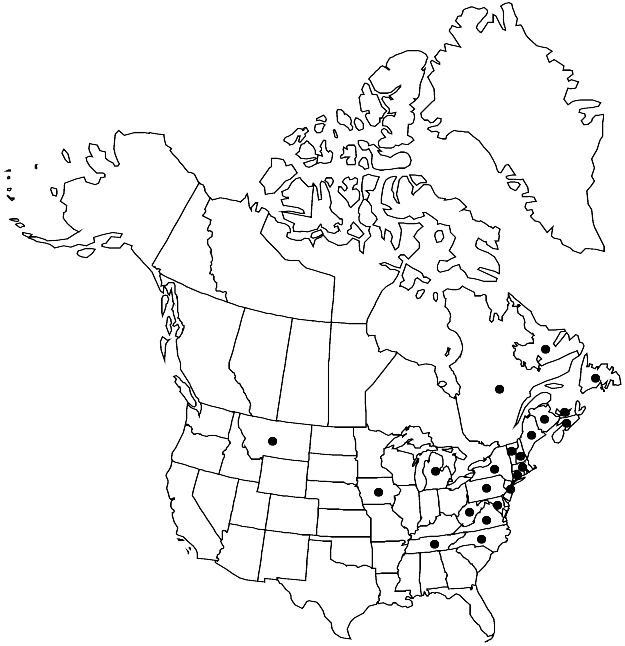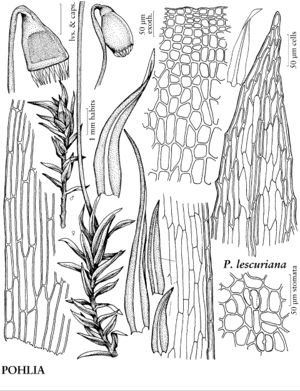Difference between revisions of "Pohlia lescuriana"
J. Fac. Educ. Tottori Univ., Nat. Sci. 19: 31. 1968.
FNA>Volume Importer |
FNA>Volume Importer |
||
| Line 33: | Line 33: | ||
|elevation=low elevations | |elevation=low elevations | ||
|distribution=N.B.;Nfld. and Labr.;N.S.;P.E.I.;Que.;Conn.;Iowa;Maine;Md.;Mass.;Mich.;Mont.;N.H.;N.J.;N.Y.;N.C.;Pa.;Tenn.;Vt.;Va.;W.Va.;Europe. | |distribution=N.B.;Nfld. and Labr.;N.S.;P.E.I.;Que.;Conn.;Iowa;Maine;Md.;Mass.;Mich.;Mont.;N.H.;N.J.;N.Y.;N.C.;Pa.;Tenn.;Vt.;Va.;W.Va.;Europe. | ||
| − | |discussion=<p>Pohlia lescuriana is an inconspicuous woodland species in eastern North America; it often grows in small sterile patches and can be recognized by the slender, pale green shoots. The sporophytes, never common, are short-pyriform to urceolate when dry. Yellow to orange gemmae sometimes occur on the rhizoids.</p> | + | |discussion=<p><i>Pohlia lescuriana</i> is an inconspicuous woodland species in eastern North America; it often grows in small sterile patches and can be recognized by the slender, pale green shoots. The sporophytes, never common, are short-pyriform to urceolate when dry. Yellow to orange gemmae sometimes occur on the rhizoids.</p> |
|tables= | |tables= | ||
|references= | |references= | ||
| Line 57: | Line 57: | ||
|publication year=1968 | |publication year=1968 | ||
|special status=Selected by author to be illustrated | |special status=Selected by author to be illustrated | ||
| − | |source xml=https://jpend@bitbucket.org/aafc-mbb/fna-data-curation.git/src/ | + | |source xml=https://jpend@bitbucket.org/aafc-mbb/fna-data-curation.git/src/8f726806613d60c220dc4493de13607dd3150896/coarse_grained_fna_xml/V28/V28_321.xml |
|genus=Pohlia | |genus=Pohlia | ||
|species=Pohlia lescuriana | |species=Pohlia lescuriana | ||
Revision as of 18:04, 18 September 2019
Plants small, pale whitish, somewhat glossy. Stems 0.3–0.8 cm. Leaves erect to ± spreading, lanceolate, 0.7–1.2 mm; base not or scarcely decurrent; margins serrulate to serrate in distal 1/3; costa subpercurrent; distal medial laminal cells linear-rhomboidal, 65–110 µm, walls thin. Specialized asexual reproduction occasionally present; rhizoidal tubers orange, orange-brown, or yellow. Sexual condition dioicous; perigonial leaves ovate; perichaetial leaves weakly differentiated, lanceolate to linear-lanceolate. Seta orange-brown. Capsule inclined 95–180°, brown to stramineous, broadly short-pyriform, neck 1/3 urn length; exothecial cells short-rectangular, walls sinuate; stomata superficial; annulus present; operculum short- to long-conic; exostome teeth light yellow-brown, triangular-acute; endostome hyaline, basal membrane 1/2 exostome length, segments tapered apically, distinctly keeled, broadly perforate, cilia short to rudimentary. Spores 15–21 µm, finely roughened.
Phenology: Capsules mature spring (Apr–Jun).
Habitat: Disturbed soil, soil on upturned tree bases, path banks, rock crevices, along streams
Elevation: low elevations
Distribution

N.B., Nfld. and Labr., N.S., P.E.I., Que., Conn., Iowa, Maine, Md., Mass., Mich., Mont., N.H., N.J., N.Y., N.C., Pa., Tenn., Vt., Va., W.Va., Europe.
Discussion
Pohlia lescuriana is an inconspicuous woodland species in eastern North America; it often grows in small sterile patches and can be recognized by the slender, pale green shoots. The sporophytes, never common, are short-pyriform to urceolate when dry. Yellow to orange gemmae sometimes occur on the rhizoids.
Selected References
None.
